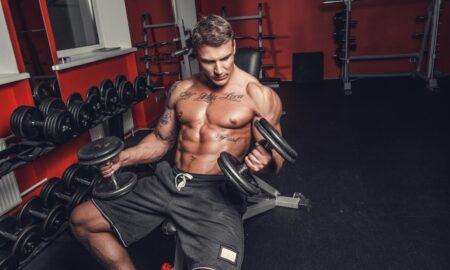 In Part 1 of this discussion we saw how lack of sleep negatively affects your anabolic hormones and promotes bodyfat accrual. It also affects your ability to perform.
In Part 1 of this discussion we saw how lack of sleep negatively affects your anabolic hormones and promotes bodyfat accrual. It also affects your ability to perform.
Sleep and Exercise
Most studies examining the effects of sleep on training have been contradictory, with some showing negative effects, others none. Some trends have become clear, however. For example, studies show that if high-intensity exercise is done in the afternoon, it will adversely affect sleep at night. Low-intensity exercise, however, has no effect on sleep, unless the exercise is prolonged.1 Training in the morning has no effect on sleep.
Overtraining may indirectly affect sleep quality. Studies show that overtrained athletes move around more when they sleep, which can have a disturbing influence. I recall once visiting the home of a well-known professional bodybuilder. I noticed that he had a small Army cot next to a larger bed. “Who sleeps on the cot?” I asked.
“I do,” he replied. “My wife moves around too much when she sleeps, and that keeps me up, hence the cot.” His pragmatic approach made sense to me. It’s underscored by the fact that he’s still married to the same woman nearly 40 years later.
Lack of sleep may affect some forms of exercise more than others. For instance, studies show that partial sleep deprivation led to a lowered maximal oxygen intake, along with higher accumulation of lactate, a marker of exercise fatigue. Those lacking sleep show higher heart rates and more labored breathing while training. That all points to insufficient sleep adversely affecting endurance, or aerobic, training. The insulin resistance induced by sleep deficiency adds to that effect, as it interferes with glucose use in muscle.
What about weight training? One study examined the effect of exercise—weight training—in depressed older people.2 It featured 32 subjects with an age range of 60 to 84 who engaged in a weight-training program three times a week. Another group didn’t train. Those in the weight group reported improved sleep quality, along with less depression, which itself can interfere with sleep. Because sleep is a particular problem for older people, the study suggests, weight training can help improve their sleep.
Another study had eight male subjects, aged 18 to 24, who slept only three hours a night for three consecutive nights, then had a four-day phase of normal sleep. The segments were separated by 10 days. The men trained on a weight program that included biceps curls, bench presses, leg presses and deadlifts. Initial tests were done to establish maximal lifts. Lack of sleep didn’t affect biceps training but did affect the bench press, leg press and deadlift. The deterioration in performance on those exercises became significant on the second day of sleep deprivation. The implication is that large-muscle-mass exercises are affected more adversely by a lack of sleep than exercise of smaller muscle areas, such as the arms.
Researchers put physical-education students on light exercise in the morning, evening and late evening. Exercising in the late evening resulted in subjective reports of better sleep, along with less daytime sleepiness.4
How can exercise aid sleep? Several mechanisms have been suggested:
• Anxiety reduction. Disturbed sleep is closely associated with anxiety, and anything that reduces anxiety, such as exercise, will help promote sleep.
• Antidepressant effect. Disturbed sleep is a hallmark of mental depression. Since exercise is a natural antidepressant, it can promote sleep. One theory suggests that exercise rapidly relieves depression by suppressing REM, which seems to lower depression. Reducing REM sleep by 25 percent showed significant antidepressant effects.
• Thermogenic effect. Exercise increases slow-wave sleep, possibly due to elevated body temperature. That leads to a lowered body core temperature, which is a sleep signal. Studies show that a drop in body temperature of one degree near bedtime is an internal signal that triggers the drive to fall asleep. For those who don’t work out, taking a hot bath about an hour prior to bedtime can trigger the sleep response because of a rapid core temperature lowering that begins as soon as you step out of the bath.5
One other thing: The common notion that exercising late at night will lead to sleep disturbances just isn’t true. One study involved subjects who not only exercised vigorously late at night but were also subjected to bright-light exposure, which is thought to delay sleep by interfering with the release of melatonin. Neither exercising nor exposure to bright light, however, had any adverse effects on sleep.6
Nutrition and Sleep
What you eat definitely affects how you sleep. One recent study found that not getting enough sleep had a negative effect on antioxidant defense systems.7 The study looked at how a lack of sleep affects glutathione, as well as several other antioxidants. After five to 10 days of sleep deprivation, the antioxidants catalase and glutathione decreased in the liver by 23 to 36 percent—a magnitude that compromises antioxidant defenses and opens the door to a multitude of diseases related to out-of-control oxidation, including cancer and cardiovascular disease.
Given those results, you might be tempted to take antioxidant supplements at bedtime. Another recent study, however, suggests that those who take vitamins experience impaired sleep. The subjects were 772 people, age range 20 to 98, who answered a questionnaire concerning their sleep habits. Those who took vitamins experienced poorer sleep than those who didn’t, including awakening more during the night, which interferes with sleep quality.8 There are, however, several caveats to consider. As the authors noted, no single vitamin is known to disturb sleep, but a combination may do so. Another factor to consider is that those with sleep problems are more likely to take vitamins in the hope that they may aid sleep. So the sleep problems may have preceded vitamin intake. While there is no link between vitamin use and sleep problems, factors that cause insomnia, such as anxiety and depression, also invite vitamin use. As the authors themselves note, “The results of this study are unreliable and unreplicable.”
Taking certain nutrients shortly before bed can indirectly have negative consequences for sleep. For example, a high dose of water-soluble vitamins, such as the B-vitamins or vitamin C, has diuretic effects that can interfere with sleep quality. They are also cofactors in the production of brain-stimulating substances—just what you don’t need at bedtime. Even amino acids can stimulate the brain and produce insomnia.
High-glycemic-index, or simple, carbs can aid sleep.9 Only simple, or fast-acting, carbs are effective for that purpose because of the heightened insulin release that results. Insulin drives all amino acids circulating in the blood into muscle except L-tryptophane, an amino acid that converts in the brain to the neurotransmitter serotonin. That gives tryptophane easier access to the brain. Tryptophane itself is a precursor of melatonin synthesis.
High-fat foods, because of their lengthy digestive time, bring on lethargy and sleepiness. On the other hand, eating a high-protein, low-carb meal prior to sleep can produce insomnia because it induces brain stimulation from certain amino acids, such as tyrosine. Caffeine intake would not be amenable to sleep, as it’s a stimulant that interferes with the activity of adenosine, a calming brain chemical. Nicotine also is a brain stimulant. While alcohol is a depressant and so can help induce sleep, the sleep it supports is impaired because it interferes with normal sleep cycles.
Despite the research suggesting that taking vitamins may interfere with sleep, several other nutrients have proven effective in inducing sleep and relieving insomnia:
• Inositol. When taken in large doses—four to 18 grams—this nutrient helps reduce panic attacks, which keep those who suffer from them awake.
• Magnesium. A natural sleep-inducing mineral when taken at a dose of 300 milligrams before bed.
• L-theanine. An amino acid found naturally in tea; at doses ranging from 200 to 400 milligrams it facilitates relaxation.
• Valerian. An herb that works through the same receptors as prescription sleep aids. The dose is 400 to 600 milligrams. Caution: it smells terrible!
• 5-HTP. This is a by-product of the amino acid tryptophane that directly converts into serotonin. The dose is 100 milligrams.
• Melatonin. Minimize the dose to prevent morning grogginess. The dose range is one to five milligrams. A recent study of 170 people over age 55 found that taking two milligrams a day of a timed-release melatonin supplement for three weeks improved the quality of sleep and mental alertness in the morning. The researchers suggest that melatonin offers a “benefical treatment effect on the restorative quality of sleep.” No significant side effects occurred in any of the subjects.10 Using a timed-release form is superior because melatonin is rapidly degraded, which can lead to premature awakening. A bonus of melatonin is increased growth hormone release, which likely occurs because melatonin speeds the way toward the deeper, slow-wave sleep stages, when GH release is maximal. While the mechanism of melatonin in inducing sleep isn’t known, one theory is that it works by lowering core body temperature, which is a primary sleep signal. Melatonin is also a potent antioxidant that may help prevent various diseases and slow the aging process.
Besides nutrition, there are several methods of bringing on sleep that don’t involve drugs:11
• Inverted posture. Neck and chest below the heart with legs above the heart. That posture lowers sympathetic hormones, which are stimulatory, and promotes a parasympathetic response, which produces relaxation.
• Skin warming and cooling. As noted above, warming the body leads to a lowering of body core temperature, which initiates sleep. Methods include a hot foot bath, a hot bath, warm blankets, socks, thermal feedback and consuming ice. Stretching to reduce muscle tone may also aid relaxation and sleep.
• Sensory withdrawal. Darkness, quiet and rhythmic sound, or “white noise,” aid in this. Note that exposure to bright light inhibits melatonin release.
• Breathing techniques. Slow exhalation (count to 10) reduces sympathetic activity while increasing parasympathetic activity. The technique is commonly used by yoga practitioners and produces a feeling of calm. Raising the carbon dioxide content of the blood through heavy, rapid breathing quickly brings on drowsiness but can also cause acute anxiety in some people.
When all else fails, consider taking a nap. Studies show an inverse relationship between naps and fatal heart attacks. One study from Greece of 23,000 people found that those who regularly took naps had a 37 percent reduction in coronary mortality compared to those who never napped. Occasional nappers showed a 12 percent reduction. The protective effect is linked to the lowering of blood pressure that occurs just before sleep.
A recent study of 20 men and 22 women found that a two-hour midafternoon nap following a night of sleep loss lowered levels of the inflammatory chemicals cortisol and interleukin-6, both of which are elevated during sleep deprivation.12 During his bodybuilding-competition years, Arnold Schwarzenegger habitually napped between his morning and late-afternoon training sessions. Arnold may have been ahead of his time in that regard—or then again, he may have just been tired. Arnold says that a key to his success is in the way he handled stress, and napping may have played a role.
What happened to our friend Randy Gardner from Part 1 of this discussion? He’s alive and well, still sleeping soundly—although not excessively, I assume. In any case, his sleep-deprivation record turned out to be short-lived. Another high school student shattered it by two hours about two weeks later. The last listing for the sleep-deprivation record in the Guinness Book of World Records dates back to April 1977—449 hours set by a British woman. Those who are contemplating breaking that record should seek other pursuits. The Guinness Book no longer lists the sleep record, considering it too dangerous. So, prospective applicants, rest easy. You might consider going for the egg-swallowing record. Better yet, take a nap!
References
1 Driver, H.S., et al. (1996). Sleep disturbance and exercise. Sports Med. 21:1-6.
2 Singh, N.A., et al. (1997). A randomized controlled trial of the effect of exercise on sleep. Sleep. 20:95-101.
3 Reilly, T., et al. (1994). The effect of partial sleep deprivation on weightlifting performance. Ergonomics. 37:107-115.
4 Yoshida, H., et al. (1998). Effects of the timing of exercise on the night sleep. Psych Clin Neurosci. 52(2):139-40.
5 Youngstedt, S.D. (2005). Effects of exercise on sleep. Clin Sports Med. 24:355-65.
6 Youngstedt, S.D., et al. (1999). Is sleep disturbed by vigorous late-night exercise? Med Sci Sports Exerc. 31:864-869.
7 Everson, C.A., et al. (2005). Antioxidant defense responses to sleep loss and sleep recovery. Am J Physiol Regul Integr Comp Physiol. 288:R374-R383.
8 Lichstein, K.L., et al. (2007). Vitamins and sleep: An exploratory study. Sleep Med. 9:27-32.
9 Afaghi, A., et al. (2007). High-glycemic-index carbohydrate meals shorten sleep onset. Am J Clin Nutr. 85:426-30.
10 Lemoine, P., et al. (2007). Prolonged-release melatonin improves sleep quality and morning alertness in insomnia patients ages 55 and older and has no withdrawal effects. J Sleep Res. 16:372-80.
11 Cole, R. (2005). Nonpharmacologic techniques for promoting sleep. Clin Sports Med. 24:343-353.
12 Vgontzas, A., et al. (2007). Daytime napping after a night of sleep loss decreases sleepiness, improves performance, and causes benefical changes in cortisol and interleukin-6 secretion. Am J Physiol Endocrin Metab. 292(1):E253-61.
13 Parkinson, A.B., et al. (2006). Anabolic androgenic steroids: a survey of 500 users. Med Sci Sports Exerc. 38:644-51.
14 Venancio, D., et al. (2008). Effects of anabolic androgenic steroids on sleep patterns of individuals practicing resistance exercise. Eur J Appl Physiol. 102(5):555-60.
15 Schierenbeck, T., et al. (2008). Effect of illicit recreational drugs upon sleep: Cocaine, ecstasy, and marijuana. Sleep Med Rev. In press.
16 Murphy, P.J., et al. (1996). Nonsteroidal anti-inflammatory drugs alter body temperature and suppress melatonin in humans. Phys Behav. 59:133-39. IM




















You must be logged in to post a comment Login